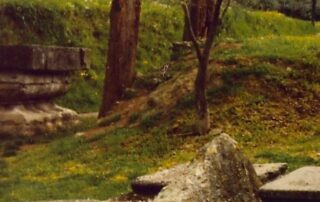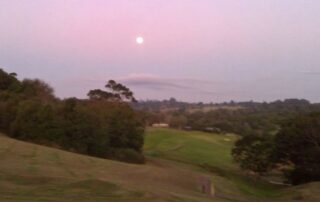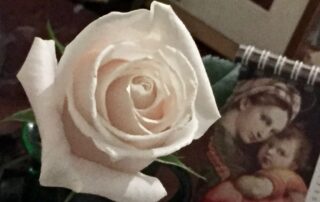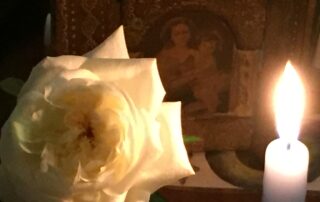![]()
“As poets and as readers we are both the users and the transmitters of this lexicon. Today we need to keep adding not subtracting meaning, remembering not forgetting, to connect ourselves to the chain that ultimately joins all cultures.”
Sophia Nugent-Siegal
Welcome to Lexicon
 Wittgenstein famously concluded his Tractatus with the memorable comment: “Whereof we cannot speak, thereof we must remain silent”.
Wittgenstein famously concluded his Tractatus with the memorable comment: “Whereof we cannot speak, thereof we must remain silent”.
Unlike Ludwig, Sophia, in whose memory this site is maintained, did not accept “remaining silent” as a viable intellectual option—not because she thought ultimate meaning any more expressible than did Wittgenstein, but because she thought the battle was necessary.
Heroic, doomed to failure, absolutely essential.
To Believe…
To Believe... In publishing each new work for Sophia’s Notebook, a corresponding poem (or poems) is selected from Sophia’s own body of work as an accompaniment. Why? Because, as the award in her name highlights, Sophia—that born historian—believed that culture (in particular, art and literature) represents an ongoing conversation across time. As T. S. Eliot stated in his seminal essay on literary tradition, the significance of any poet must be interpreted in terms of the “appreciation of his relation to the dead poets and artists.” So too, for Sophia, art and literature were an interactive process—one that for historian Sophia
Finding the Light
Finding the Light Paul Kingsnorth’s* stunning poem, Hymn of Entry, is everything Sophia would wish in a work for Sophia’s Notebook.The poem fulfills each of the principles laid out on the splashdown page of this website (principles which Sophia herself lived so fully): Be brave. Seek truth. Love wisdom. Live beauty. Courage. Truthfulness. Wisdom. Beauty. How necessary these are, how precious, and how rare. In its fierce loveliness, Paul’s poem really does speak to the heart. Artist (and Sophia’s aunt), Clare Llewelyn, and calligrapher, Margaret McGinnis, have in their artwork (the cover pen and ink and the printed text respectively)
“Sophie came into the world as herself…”
“Sophie came into the world as herself…” July 30th. It’s Sophia’s birthday. As always, I find myself thinking of the parameters of her life: birth, death, life’s cosmic bookends in this sublunary world. How does one define a life? Sophia had 22 years of it, 22 years of life. Keats had 25. Dante’s Beatrice, 24. The numbers tell us nothing. And everything. So young. So young. It hurts to think of it. How does one measure the dimensions of a life? No scale is large enough, no scale true enough. We get lost in a thicket of adjectives trying to
A Moment to Look Outside the World…
A Moment to Look Outside the World… In the note Sophia left with requests to be undertaken in the case of her death, she asked that a diptych of the Crucifixion and the Resurrection be made and given to St John’s Anglican Cathedral in Brisbane. An extraordinary pair of paintings by Australian artist, Peter Hudson, set in a display case exquisitely handcrafted by traditional craftsman Rob Lamont from Queensland silky oak, has therefore been given to St. John’s in fulfillment of Sophia’s request. (Thank you, dear Peter and Rob, for making her wishes so wonderfully and wholly real, and to
Spoken Soul
Spoken Soul Some lights burn true, whatever the darkness. Sophia 30.07.1991--17.01.2014 Out of the Burning Bury me in garlands Of burning paper With all my pollen sparks of steel Sophia Nugent-Siegal Out of the burning fire Truth remains true Its generative spark whirls up Into the shadowed world Spoken soul, Fæst*, unbroken Of singular self tempered, Made to be Wrought living In a purifying fire By R. Nugent Wrought living,
God Is With Us
God Is With Us Sophia always loved Christmas. As a child, she had loved the joy and excitement, the thrilling expectation written into it all, but she also loved the mystery woven into the story, the sense that a great drama was being played out for us to understand, one with deep symbolic significance. As an adult and as a scholar, the significance was even more real to her. It is for this reason that she asked for a passage from St Athanasius’ On the Incarnation (one of the intellectual jewels of Late Antiquity) to be read at her funeral—where
Love is Eternal
Love is Eternal “Politics and law pass, as the supremacy of the Roman Empire and her eloquently complex legal system passed. If Christ’s message had been about overthrowing or changing it, He would be as historically insignificant as a thousand of his contemporary Jewish radicals. Love, however, is eternal.” Sophia Nugent-Siegal St Mark’s Review, No. 217, Aug 2011: 112-115. It’s your birthday, Soph. Another year, another birthday Time’s mechanism moves deliberately to its purposed end. “Love, however, is eternal.” True, darling. Loving you always, beautiful child. ****** The poet selected for Sophia's
Flotsam and Jetsam
Flotsam and Jetsam UK poetry journal, Shearsman, has published another suite of poems (a sequence of eight individual poems), Flotsam and Jetsam, by Sophia in its Spring edition (Shearsman: Vols. 139 & 140). Given the formative years she had spent in England as a child, Sophia would be pleased, both as poet and historian, by the further underlining of this connection. There is a particular poignancy to Flotsam and Jetsam. Not only does it represent the work with which Sophia signed off on the collection, Rough Sleepers, which had been written through all the difficulty and upheaval of the preceding
To Be…
To Be… An elegy by Gershon Maller, dedicated to Sophia, was recently selected for competition in the ACU Poetry Prize. The poem has now been published in the 2023 anthology, Love. In linguistics and logic, the principal copula verb (connecting subject and predicate) is, in English, the verb “to be.” I am. You are. She is. Such a little word, is, the full meaning of which is only truly apparent to us when we must live the absence of it, when we must live with loss. (there is) (no word) (for love) How do we speak of it? How do we
No Coward Soul
No Coward Soul Ten years ago, ten years ago today, the machines in the ICU were turned off and Sophia died. In That Sleep… Bury me in my carapace of stone Like a molten Eleanor Without half a face Bury me in garlands Of burning paper With all my pollen sparks of steel Bury me in my mâché wings Folded into ribs of bone Netted into needles The firmament is the skin of a broken statue And the lungs of the earth are sacrificial flowers Yet no soul is pinioned in hollow bone By Sophia Nugent-Siegal So I did bury









